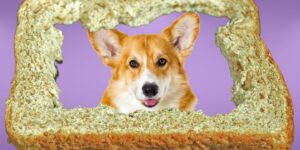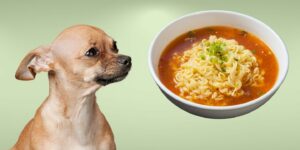Yes, dogs can eat soup, but it should be given to them in moderation and in small portions. Soup can be a nutritious and tasty addition to a dog's diet, but it's important to choose the right ingredients and avoid adding any seasonings or condiments that could be harmful to your dog.
Benefits of Feeding Soup to Dogs
Hydration and Moisture
Soup can provide a variety of benefits to dogs. For one, it can be a great source of hydration, especially for dogs who may not be drinking enough water on their own. Soup can also be a good way to add moisture to a dog's diet, which can be especially important for senior dogs or those with dental issues.
Nutrient Content
Additionally, soup can be a good source of nutrients, such as protein, carbohydrates, and essential vitamins and minerals. Depending on the ingredients used, soup can provide a balanced and healthy meal for your dog.
Palatability and Encouraging Appetite
Soup can be a tasty and appealing meal for dogs, which can help encourage appetite in dogs that may be picky eaters or undergoing medical treatment.
Digestibility and Easy-to-Eat Options
Soups are easily digestible and can be a great option for dogs with sensitive stomachs or those recovering from surgeries where eating solid food may be more difficult.
Choosing the Right Ingredients for Soup
Safe Protein Sources
- Chicken
- Beef
- Fish
- Turkey
When choosing ingredients for soup, it's important to avoid any that could be harmful to your dog. Some common protein sources that are safe and nutritious for dogs include chicken, beef, fish, and turkey.
Safe Vegetables
- Carrots
- Peas
- Sweet Potatoes
- Green Beans
- Pumpkin
Vegetables like carrots, peas, sweet potatoes, green beans, and pumpkin can also provide essential vitamins and minerals for your dog and are safe ingredients to include in their soup.
Safe Grains and Starches
- Rice
- Quinoa
- Barley
- Whole Grain Pasta
Including safe grains and starches, such as rice, quinoa, barley, and whole grain pasta, can add carbohydrates and fiber to your dog's meal, while also making the soup more filling.
Safe Herbs
- Parsley
- Basil
- Thyme
- Rosemary
Herbs like parsley, basil, thyme, and rosemary can add flavor to your dog's soup without posing any health risks.
Broth Choices
- Low-Sodium Broth
- Bone Broth
- Vegetable Broth
When choosing a broth for your dog's soup, opt for low-sodium, bone, or vegetable broths, as these are safer and healthier options for your dog.
Ingredients to Avoid
Toxic Ingredients
- Onions, Garlic, and Chives
- Grapes and Raisins
- Chocolate and Caffeine
- Nuts, especially Macadamia Nuts
Avoid adding toxic ingredients, such as onions, garlic, chives, grapes, raisins, chocolate, caffeine, and certain nuts, as these can be harmful to your dog's health.
Harmful Seasonings and Condiments
- Salt
- Pepper
- Sugar
- Artificial Sweeteners
- Nutmeg
- Spices and Herbs Unsafe for Dogs
It's also crucial to avoid harmful seasonings and condiments like salt, pepper, sugar, artificial sweeteners, nutmeg, and any other spices or herbs that are unsafe for dogs.
Serving Size and Frequency
Portion Sizes
When it comes to feeding soup to your dog, it's important to pay attention to portion size. The soup should only be given to your dog as a treat or occasional meal and should not replace their regular dog food. A good rule of thumb is to only give your dog a few spoonfuls of soup at a time and to avoid overfeeding.
Monitoring Your Dog's Reaction
It's also important to monitor your dog's reaction to the soup. If they seem to enjoy it and tolerate it well, it's safe to continue feeding it to them in moderation. However, if they show any signs of discomfort, such as vomiting or diarrhea, it's best to stop feeding them soup and consult with your veterinarian.
Consulting with Your Veterinarian
Before incorporating soup into your dog's diet, it's always best to consult with your veterinarian to ensure there are no potential health risks or dietary concerns.
Conclusion
In conclusion, dogs can safely eat soup as long as it is given to them in moderation and in small portions. Soup can be a nutritious and tasty addition to a dog's diet, but it's important to choose the right ingredients and avoid adding any seasonings or condiments that could be harmful to your dog. By following these guidelines, you can safely and happily share soup with your furry friend.











